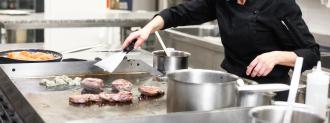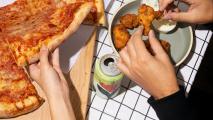The pandemic has forced many restaurants to lean into food delivery — and for a growing number of eateries, that means relying on ghost kitchens.
Also known as “virtual kitchens” or “cloud kitchens,” these facilities have everything you’d find in a typical restaurant kitchen: stoves, walk-in refrigerators, skilled chefs, etc.
What they don’t have, though, are waiters, tables, or even a dedicated menu — these kitchens are just for making and delivering to-go orders for outside restaurants.
Sometimes, the chefs cooking in them don’t even work for the restaurant whose recipes they’re preparing. But if the ghost kitchen does its job right, the customer never knows their food wasn’t prepared in the back of house at their favorite restaurant.
Ghost Kitchens on the Come Up
Ghost kitchens predated the pandemic — but not by much.
They first became a “thing” in response to the rise of online food delivery services, like DoorDash and Grubhub, which gave people the ability to get delivery from many restaurants that previously only offered dine-in or take-out.
Those restaurants still needed to cook meals for their in-house customers, so some would rent time in a ghost kitchen — which can be as large as a warehouse — to meet the extra delivery demand.
Other restaurants chose to completely outsource their online delivery. The company Reef Technologies, for example, operates more than 4,500 ghost kitchens that can handle the entire process for a restaurant.
“It doesn’t cost them anything,” COO Carl Segal told the New York Times in September. “We enter into a partnership with them, we keep the revenue and pay them a royalty percentage every month.”
A Lifeline During the Pandemic
The ghost kitchen model isn’t flawless — if a restaurant doesn’t ensure that the quality of the food coming out of a ghost kitchen meets its standards, the brand can take a hit — but the pandemic has left some restaurants with little option but to buy in.
While online food orders may have been a growing source of income for restaurants before 2020, once the pandemic started — and many could no longer serve customers in-house — they became the main source of income for some.
Because of COVID, we’ve moved five years in three months.
Geoff Madding
Now, some restaurants, including San Francisco’s Dosa, only serve food out of ghost kitchens, as a way of avoiding the overhead costs of operating a physical location — where most of the space is given over to an empty dining room, and most of the rent going for a prime location that no longer matters.
Others are using ghost kitchens to generate more vital delivery income by expanding their delivery market — Manhattan restaurant Jack’s Wife Freda, for example, will soon use Reef Technologies’ ghost kitchens to deliver food to customers in Brooklyn.
Ultimately, while the pandemic has been a force of destruction for much of the restaurant industry, it’s been a boon for ghost kitchens.
“Because of COVID, we’ve moved five years in three months,” Geoff Madding, CEO of ghost kitchen operator Nextbite, told Restaurant Dive.
We’d love to hear from you! If you have a comment about this article or if you have a tip for a future Freethink story, please email us at tips@freethink.com.






